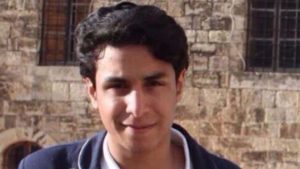 URGENT CALL: RELEASE ATTORNEY SHADI SADR
URGENT CALL: RELEASE ATTORNEY SHADI SADR
Shadi Sadr, who is a lawyer and journalist, was walking with a group of women’s rights activists on a road in Tehran when men in civilian clothes grabbed her and attempted to push her into a car. Shadi Sadr lost her headscarf and coat in the ensuing struggle but managed briefly to escape. She was quickly recaptured and beaten with batons, and was then taken away in the car.
(SCE: Shadai sadr was the co-attorney for juvenile female Nazanin Fatehi who was facing execution for killing a rapist in self defense at the age of 17. Her other co-attorney Mohammad Mostafaei was also arrested last month and released on bail after one week.)
Shadi Sadr and the group of women were on their way to Tehran University to attend the first Friday prayers since the disputed presidential election to be led by former President Ali Akbar Rafsanjani.
Shadi Sadr is the defence lawyer of human rights defender Shiva Nazar Ahari, a blogger and journalist who is a member of the Committee of Human Rights Reporters, who was arrested at her home in Tehran on 14 June, shortly after the presidential election, by security officials who searched her house and took away personal items. She is now believed to be held in Section 209 of Tehran’s Evin Prison where Shadi Sadr had not been able to gain access to her.
PLEASE WRITE IMMEDIATELY in Persian, Arabic, English, French or your own language:
- calling on the authorities to release Shadi Sadr immediately and unconditionally, as she is a prisoner of conscience, held solely for her human rights activities and the peaceful exercise of her rights to freedom of expression,
- urging them to disclose her whereabouts immediately, and ensure that she is allowed immediate access to her family, lawyer of her choice and any medical treatment she may require;
- urging the authorities to ensure that Shadi Sadr is protected from all forms of torture or other ill-treatment;
- calling on the authorities to remove unlawful restrictions on freedoms of expression, association and assembly in Iran.
PLEASE SEND APPEALS BEFORE DD/MONTH/YEAR TO:
Leader of the Islamic Republic
Ayatollah Sayed ‘Ali Khamenei
The Office of the Supreme Leader
Islamic Republic Street – End of Shahid Keshvar Doust Street, Tehran, Islamic Republic of Iran
Email: via website:
http://www.leader.ir/langs/en/index.php?p=letter (English)
http://www.leader.ir/langs/fa/index.php?p=letter (Persian)
Salutation: Your Excellency
Head of the Judiciary
Ayatollah Mahmoud Hashemi Shahroudi
Howzeh Riyasat-e Qoveh Qazaiyeh (Office of the Head of the Judiciary)
Pasteur St., Vali Asr Ave., south of Serah-e Jomhouri, Tehran 1316814737, Islamic Republic of Iran
Email: shahroudi@dadgostary-tehran.ir
(In the subject line write: FAO Ayatollah Shahroudi)
Salutation: Your Excellency
And copies to:
Iranian Bar Association
No. 3, Zagros St.,
Argentina Sq.,
Tehran,
Islamic Republic of Iran
Fax: +98 21 8771340
or +98 21 888 6425/ 26
Email: tamas@iranbar.org
or mail@iranbar.org
Also send copies to diplomatic representatives accredited to your country.
Please check with your section office if sending appeals after the above date.
| URGENT ACTION |
| HUMAN RIGHTS DEFENDER RISKS TORTURE |
| Additional Information |
| Shadi Sadr, a lawyer and journalist, was the director of Raahi, a legal advice centre for women until it was closed in March 2007. She set up Zanan-e Iran (Women of Iran), the first website dedicated to the work of Iranian women’s rights activists and she has written extensively about Iranian women and their legal rights. She has represented activists and journalists and has represented several women sentenced to death, whose convictions were subsequently overturned. She is also involved in the Stop Stoning Forever Campaign (see: www.meydaan.com). Shadi Sadr was previously detained on 4 March 2007 during a protest about the trial of five women’s rights activists in Tehran (see UA 52/07, MDE 13/021/2007, 5 March 2007 and follow-up: http://www.amnesty.org/en/library/info/MDE13/021/2007/en). In the days following the 13 June announcement that President Ahmadinejad had won the previous day’s presidential election, which hundreds of thousands of Iranians dispute, the authorities imposed draconian restrictions on freedom of expression, association and assembly. The security forces, including the paramilitary Basij, have been widely deployed in the streets; communications have been significantly disrupted. Iranian publications have been banned from publishing information about the nationwide unrest since the result was declared. Foreign journalists have been banned from the streets, their visas not renewed and some foreign reporters have been arrested or expelled from the country. According to statements by officials recorded by Amnesty International, over 2,000 people have been arrested since 12 June by the police and Basij forces across the country during demonstrations or their aftermath. These include prominent political figures close to either presidential candidates Mir Hossein Mousavi and Mehdi Karroubi, or former President Khatami, who supported Mir Hossein Mousavi’s campaign. Some human rights defenders, as well as journalists have also been detained. On 16 June lawyer and human rights defender Abdolfattah Soltani was also arrested and detained (see UA 160/09, MDE 13/059/2009, 19 June 2009: http://www.amnesty.org/en/library/info/MDE13/059/2009/en). Journalist Issa Saharkhiz was arrested on 4 July and taken away to an undisclosed location (see UA 181/09, MDE 13/067/2009, 6 July 2009: http://www.amnesty.org/en/library/info/MDE13/067/2009/en). On 17 July, former President Ali Akbar Rafsanjani led the first Friday prayers at Tehran University since the disputed presidential election and called for the release of Iranian people detained after demonstrations or their aftermath. Thousands of opposition supporters rallied in the streets surrounding the university and interrupted his sermon with chants of support for election candidate Mir Hossein Mousavi, and police fired tear gas to disperse them. Several people were arrested. |
| UA: 193/09 Index: MDE 13/076/2009 Issue Date: 17 July 2009 |



